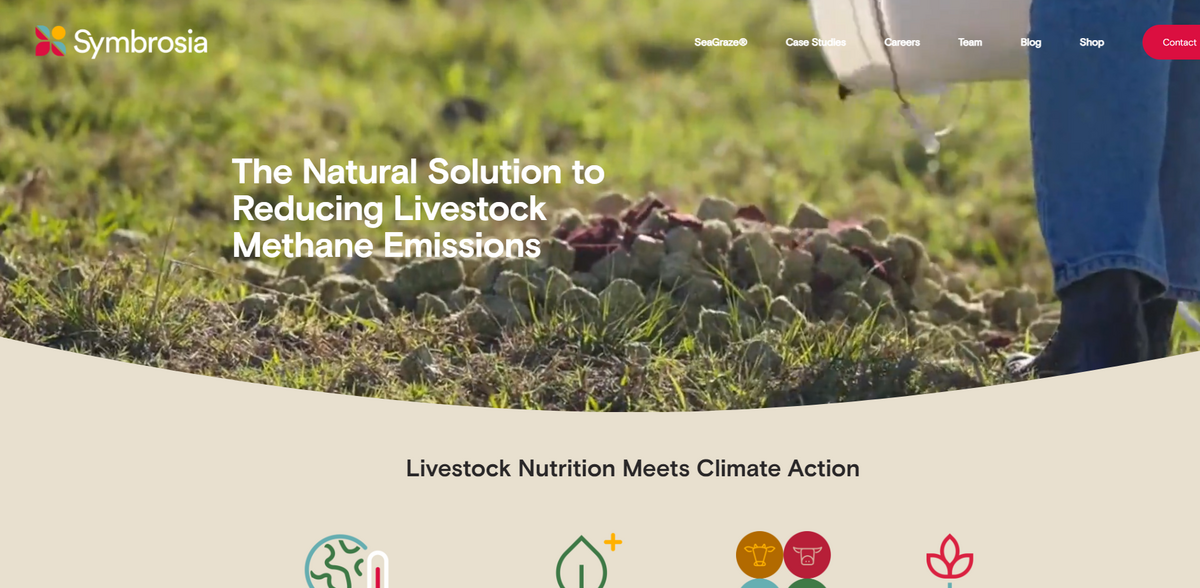What is Symbrosia?
Symbrosia is an agricultural innovation company developing natural seaweed-based products. It is all about harnessing nature’s gifts—the red macroalgae Asparagopsis taxiformis—to boost livestock productivity while making a positive environmental impact. At the heart of its portfolio is SeaGraze®, a seaweed-based feed supplement grown sustainably in Hawai’i. SeaGraze® not only supports efficient livestock growth but also helps create a sustainable production system with a natural edge… it’s a game-changing approach that aligns modern farming with nature’s own processes.
Main Benefits of the SeaGraze® Product
SeaGraze® has several impressive key figures and facts that make it stand out:
- Reduces enteric methane emissions by over 85% per animal (studies demonstrate up to 80% efficacy in some cases).
- At a 0.5% inclusion rate in ruminant feed, this tropical red seaweed not only cuts emissions but also supports immune, metabolic, reproductive, and digestive functions.
- SeaGraze® is rich in protein, minerals, vitamins, amino acids, antioxidants, and a range of beneficial polysaccharides with prebiotic properties.
- Livestock digestion accounts for about 10% of total global greenhouse gas emissions—an issue that SeaGraze® directly helps address.
- All seaweed is grown and processed in Kailua-Kona, Hawai’i, ensuring a rigorous standard of sustainability and local sourcing.
Innovative Growth and Sustainable Farming
This project takes pride in developing proprietary technologies to commercially grow Asparagopsis taxiformis. Grown with care in Hawai’i, this red seaweed does more than serve as a feed supplement; it is nature’s own nutrient-rich bioaccumulator. It absorbs essential minerals and vitamins from seawater right through its fronds, and its unique composition means that livestock not only enjoy improved digestion but also enhanced overall health. With each batch cultivated under sustainable practices, the process reflects a dedication to environmental stewardship and a deep respect for natural cycles… everything comes together in a very organic, innovative way.
Performance Guarantee and Data-Driven Impact
Among the highlights of the Symbrosia project is the SeaGraze® Performance Guarantee—a voluntary reimbursement program for beef cattle producers trialing SeaGraze® Meal or Oil. This initiative is carefully designed to ensure that participants who feed a minimum of 100 head of beef cattle for at least 180 consecutive days, and who adhere to specific feeding and handling guidelines, can receive reimbursement if the promised results are not achieved. Such a data-driven approach not only builds confidence but also provides a measurable way to monitor methane reduction. In partnership with organizations that perform rigorous methane measurements, the project even lays the groundwork for applying for carbon offsets via the VERRA protocol or relevant state markets when applicable.
Indigenous Collaboration and Local Sourcing
A significant aspect of the project lies in its connection to the local legacy and indigenous heritage of Hawai’i. Symbrosia acknowledges Hawai’i as an indigenous space that has been shaped and nurtured by Native Hawaiians (Kanaka Maoli) through generations of deep-rooted sustainable practices. All the Asparagopsis taxiformis used in SeaGraze®—often known locally as limu kohu—is grown and processed in Kailua-Kona, Hawai’i, ensuring that traditional knowledge and local stewardship are honored. This collaboration reinforces how innovation and tradition can work hand in hand to achieve modern environmental and agricultural breakthroughs.
Market Potential and Industry Impact
Symbrosia’s technology paves the way for a future where the agriculture industry can produce value-added beef and dairy products with a softer footprint on our planet. It offers livestock producers an effective, biological (non-synthetic) solution that is competitively priced, setting the stage in anticipation of impending regulations and shifting climate concerns. This forward-thinking approach invites consumer-facing dairy companies to join the movement in reducing the carbon footprint of their supply chains. It’s not just about achieving a product – it’s about carving out a new market space where sustainability and profitability grow side by side… a win-win for producers and the planet.
Project Impact on the Sustainable Development Goals
- SDG 2: Zero Hunger – Enhanced livestock productivity contributes to improved food security.
- SDG 12: Responsible Consumption and Production – Sustainable practices in seaweed cultivation drive eco-friendly production.
- SDG 13: Climate Action – Dramatic reductions in methane emissions help mitigate climate change.
- SDG 15: Life on Land – Promoting sustainable agricultural practices supports biodiversity and healthier ecosystems.
Future Prospects and Industry Expansion
Looking ahead, the trajectory for Symbrosia appears both exciting and promising. The integration of Asparagopsis taxiformis in livestock feed opens up new avenues for agricultural innovation that are essential as the livestock sector grapples with rising greenhouse gas emissions. As global demand for more sustainable practices grows, there is an expanding role for initiatives like these in shaping the future of farming. The project is not just a fleeting experiment; it represents a strategic and scalable solution in response to environmental challenges. With its roots firmly planted in Hawai’i and its eyes set on international markets, this initiative is well on its way to transforming the industry. Inserted amidst emerging climate policies and an ever-increasing need to reduce carbon footprints, this technology stands as a beacon of progress—naturally sourced, scientifically supported, and clearly poised for industry-wide impact.





















